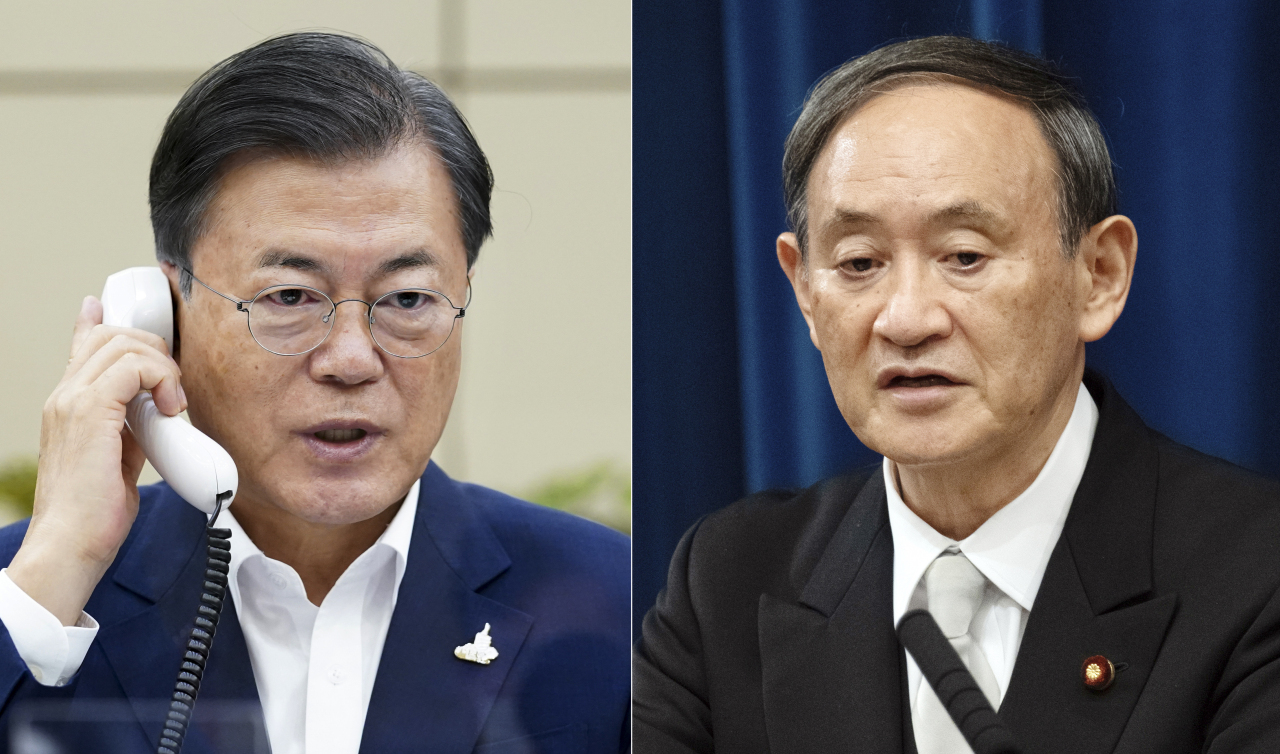Seoul seeks breakthrough in ties with Tokyo

South Korean President Moon Jae-in and Japanese Prime Minister Yoshihide Suga (Yonhap)
The South Korean government is seeking to make a breakthrough in its strained relations with Tokyo over a wartime labor dispute, with Seoul officials racing to Japan for talks with political leaders.
A delegation of bipartisan lawmakers from the Korea-Japan Parliamentarians’ Union, led by Rep. Kim Jin-pyo of the ruling Democratic Party, is in Tokyo from Thursday to Saturday to meet with its counterparts and officials to discuss ways to improve bilateral relations deteriorated by a feud over compensation for Koreans forced to work for Japanese firms during its 1910-45 colonial rule.
On Thursday, the group held a face-to-face meeting with its Japanese counterpart group, Japan-South Korea Parliamentarians’ Union, led by ruling Liberal Democratic Party member Fukushiro Nukaga.
“Political circles should help people from the two countries to better understand each other and create the environment and conditions for leaders from the two countries to solve problems,” Kim was quoted as saying during the talks.
At the meeting, delegates from Seoul proposed the two groups form a special committee for exchange and cooperation for the Tokyo Olympics, which has been re-scheduled to next July due to the COVID-19 pandemic.
The South Korean delegation is expected to meet Japanese Prime Minister Yoshihide Suga on Friday afternoon, marking the first time the Japanese leader will meet with Korean lawmakers since he took office in September.
Earlier this week, National Intelligence Service Director Park Jie-won visited Japan and met with Suga, becoming the first high-ranking official to meet the new Japanese prime minister.
“I conveyed President Moon Jae-in’s earnest greetings and intent to normalize the bilateral relations, and we had a good discussion on the North Korean issue,” Park told reporters after the meeting, stressing the leaders of the two countries have strong commitment to resolve Korea-Japan issues.
At the meeting, the spy chief also proposed issuing a new Korea-Japan declaration between Moon and Suga to build on a 1998 joint pledge between then leaders President Kim Dae-jung and Prime Minister Keizo Obuchi.
The Kim Dae-jung-Obuchi Joint Declaration, which was signed in Oct. 8, 1998, included Japan’s apology for its colonial rule and a pledge to overcome historical issues and create a “future-oriented” relationship.
But Japanese media outlets reported that the Japanese government considers Park’s suggestion “unrealistic” considering the gap in the two sides’ position on the forced labor issue.
Seoul and Tokyo have remain divided over history for decades, rooted in a dispute over Japan’s colonial rule. But the conflict reached a new level of acrimony after South Korea’s Supreme Court in 2018 ruled that Japanese firms must compensate the Koreans who were forced to work for them during World War II. The decision drew a strong rebuke from Tokyo, which claims related issues were settled under the 1965 treaty that normalized bilateral relations.
In apparent retaliation for Seoul’s verdict, Japan slapped export controls on chemicals vital to the Korean semiconductor industry last year, and hasn’t entirely lifted them. With no responses from Tokyo about financial reparations, a South Korean court in August began the liquidation process on a Japanese firm to compensate the victims, which could risk aggravating the already fragile ties further.
Seoul has been seeking to mend ties, with hopes that the planned trilateral summit between Korea, China and Japan later this year could make a breakthrough. But Suga has reportedly notified Seoul that he will not attend the summit hosted by Seoul this year, unless “proper measures” are taken to settle a feud over wartime forced labor.
There have been expectations that Seoul-Tokyo ties could improve with the incoming Joe Biden administration in the US. With the president-elect’s pledge to restore its relations with traditional allies, Biden could play a mediating role to bring the two American allies together in an effort to build a stronger linkage on security, defense and other regional issues between the three countries, experts say.
Japanese daily Asahi Shimbun reported Thursday that South Korea’s national security adviser Suh Hoon is also planning to visit Japan next week, and could propose a solution to the forced labor issue.
However, Cheong Wa Dae spokesperson Kang Min-seok dismissed the report and said “it’s not true.”
By Ahn Sung-mi (sahn@heraldcorp.com)
Source:koreaherald.com/

